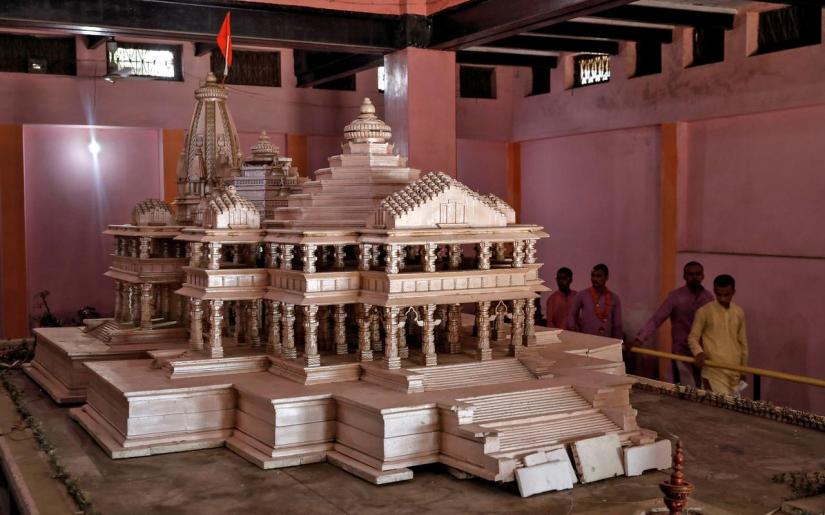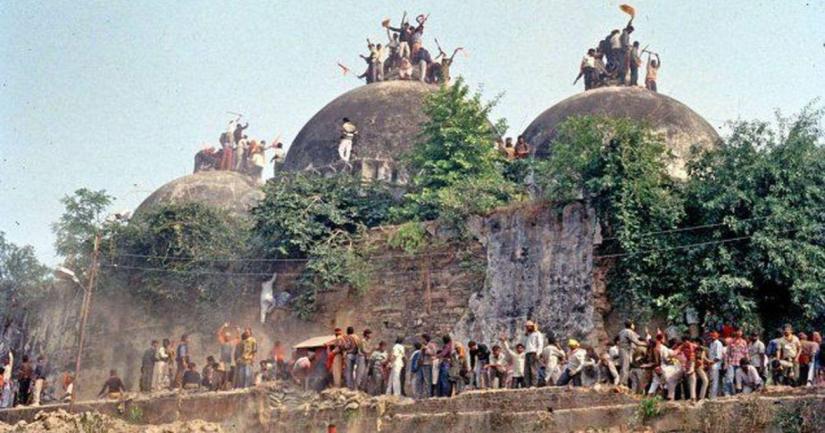 The Indian Supreme Court has dismissed the petitions seeking a review of the court’s Nov 9 verdict permitting the construction of a Hindu temple on a bitterly disputed religious site in the northern Indian town of Ayodhya, a proposal long supported by Prime Minister Narenrdra Modi's ruling Hindu-nationalist party.
The Indian Supreme Court has dismissed the petitions seeking a review of the court’s Nov 9 verdict permitting the construction of a Hindu temple on a bitterly disputed religious site in the northern Indian town of Ayodhya, a proposal long supported by Prime Minister Narenrdra Modi's ruling Hindu-nationalist party.
A five-judge Bench of the Supreme Court, led by Chief Justice of India (CJI) Sharad A. Bobde, on Thursday quashed as many as 18 petitions those sought a review of the court’s verdict on the Ayodhya site where Babri Masjid once stood before it was razed on Dec 6, 1992, by kar sevaks, reports PTI.
According to PTI, the Bench considered the review petitions and found no merit in them.
The Ayodhya verdict declined the Muslims’ claim of title over the disputed land but allowed them five acres somewhere else in the area as compensation. The unanimous judgment was originally delivered by a Bench of then CJI Ranjan Gogoi, Justices S.A. Bobde, D.Y. Chandrachud, Ashok Bhushan and S. Abdul Nazeer. Interestingly, it did not carry the name of the judge who wrote it for the Bench. Justice Bobde succeeded Justice Gogoi as CJI on the latter's retirement in mid-November and Justice Sanjiv Khanna replaced Justice Gogoi on the Review Bench. The review pleas were considered by the five judges in their chambers. Review petitions are usually examined for merit in the chambers. If the judges find the reason for the review, they would order open court hearings, during which lawyers from both sides would present their arguments.
The review pleas were considered by the five judges in their chambers. Review petitions are usually examined for merit in the chambers. If the judges find the reason for the review, they would order open court hearings, during which lawyers from both sides would present their arguments.
Among the 18 review petitions is one filed by Maulana Syed Ashhad Rashidi, president of the Jamiat Ulama-i-Hind, who said the judgment rewards “the several illegalities committed by the Hindu parties, particularly in 1934 (damaging the domes of the Babri Masjid), 1949 (desecrating the Babri Masjid) and 1992 (demolition of the Babri Masjid)”.
Yet another petition was filed by 40 prominent persons, who said the Ayodhya verdict had a direct impact on the secular fabric of the country. They include Irfan Habib, Harsh Mander, Farah Naqvi, Nandini Sundar, Shabnam Hashmi, John Dayal and Jayati Ghosh, among others, according to PTI.
 International
International
41249 hour(s) 2 minute(s) ago ;
Morning 11:57 ; Tuesday ; Jul 01, 2025
India top court dismisses review pleas in Babri Masjid verdict
Send
Bangla Tribune Desk
Published : 18:34, Dec 12, 2019 | Updated : 18:35, Dec 12, 2019
Published : 18:34, Dec 12, 2019 | Updated : 18:35, Dec 12, 2019
0 ...0 ...
/hb/
Topics: Top Stories
- KOICA donates medical supplies to BSMMU
- 5 more flights to take back British nationals to London
- Covid19: Rajarbagh, Mohammadpur worst affected
- Momen joins UN solidarity song over COVID-19 combat
- Covid-19: OIC to hold special meeting
- WFP begins food distribution in Cox’s Bazar
- WFP begins food distribution in Cox’s Bazar
- 290 return home to Australia
- Third charter flight for US citizens to return home
- Dhaka proposes to postpone D8 Summit
Unauthorized use of news, image, information, etc published by Bangla Tribune is punishable by copyright law. Appropriate legal steps will be taken by the management against any person or body that infringes those laws.
Bangla Tribune is one of the most revered online newspapers in Bangladesh, due to its reputation of neutral coverage and incisive analysis.
F R Tower, 8/C Panthapath, Shukrabad, Dhaka-1207 | Phone: 58151324; 58151326, Fax: 58151329 | Mob: 01730794527, 01730794528


